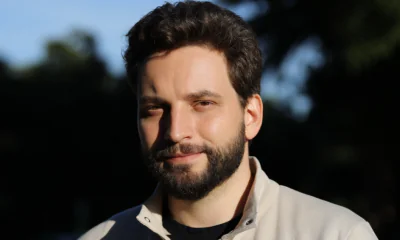Interviews
Updesh Dosanjh, Practice Leader, Technology Solutions, IQVIA – Interview Series

Updesh Dosanjh, Practice Leader of Technology Solutions at IQVIA, a world leader in using data, technology, advanced analytics and expertise to help customers drive healthcare – and human health – forward.
What is it that drew you initially to life sciences?
I’ve worked in multiple industries over the last 30 years, including the life sciences industry in the start of my career. When I chose to come back to the life sciences industry 15 years ago, it was to achieve three ambitions: work in an industry that contributed to the well-being of people; work in an area of industry that could be significantly helped by technology; and to work in an industry that gave me the chance to work with nice people. Working with a pharmacovigilance team in life sciences has helped me to meet all three of these goals.
Can you discuss what human data science is and its importance to IQVIA?
The volume of human health data is growing rapidly—by more than 878 percent since 2016. Increasingly, advanced analytics are needed to bring to light needed insights. Data science and technology are progressing rapidly, however, there continue to be challenges with the collection and analysis of structured and unstructured data, especially when coming from disparate and siloed data sources.
The emerging discipline of human data science integrates the study of human science with breakthroughs in data technology to tap into the potential value big data can provide in advancing the understanding of human health. In essence, the human data scientist serves as a translator between the world of the clinician and the world of the data specialist. This new paradigm is helping to tackle the challenges facing 21st-century health care.
IQVIA is uniquely positioned to collect, protect, classify and study the data that helps us answer questions about human health. As a leader in human data science, IQVIA has a deep level of life sciences expertise as well as sophisticated analytical capabilities to glean insights from a plethora of data points that can help life science customers bring new medications to market faster and drive toward better health outcomes. By understanding today’s challenges and being creative about how new innovations can accelerate new answers, IQVIA has leaned into the concept of human data science—transforming the way the life sciences industry finds patients, diagnoses illness, and treats conditions.
How can AI best assist drug researchers in narrowing down which specific drugs deserve more industry resources?
Bringing new medications to market is incredibly costly and time-consuming—on average, it takes about 10 years and costs $2.6 billion to do so. When drug developers explore a molecule’s potential to treat or prevent a disease, they analyze any available data relevant to that molecule, which requires significant time and resources. Furthermore, once a drug is introduced and brought to market, companies are responsible for pharmacovigilance in which they need to leverage technology to monitor adverse events (AEs)—any undesirable experiences associated with the use of a given medication—thus helping to ensure patient safety.
Artificial intelligence (AI) tools can help life sciences organizations automate manual data processing tasks to look for and track patterns within data. Rather than having to manually sift through hundreds or thousands of data points to uncover the most relevant insights pertaining to a particular treatment, AI can help life sciences teams effectively uncover the most important information and bring it to the forefront for further exploration and actionable insights. This ensures more time and resources from life science teams are reserved for strategic analysis and decision-making rather than for data reporting.
You recently wrote an article detailing how biopharmaceutical companies that use natural language processing will have a competitive edge. Why do you believe this is so important?
Life sciences companies are under more pressure than ever to innovate, as they strive to advance global health and stay competitive in a highly saturated marketplace. Natural language processing (NLP) is currently being leveraged by life science companies to help mine and “read” unstructured, text-based documents. However, there is still significant untapped potential for leveraging NLP in pharmacovigilance to further protect patient safety, as well as assure regulatory compliance. NLP has the potential to meet evolving compliance requirements, understand new data sources, and elevate new opportunities to drive innovation. It does so by combining and comparing AEs from decades of statistical legacy data and new incoming patient data–which can be processed in real-time—giving an unprecedented amount of visibility and clarity around information being mined from critical data sources.
Pharmacovigilance (the detection, collection, assessment, monitoring, and prevention of adverse effects with pharmaceutical products) is increasingly reliant on AI. Can you discuss some of the efforts being applied by IQVIA towards this?
As mentioned, one of the primary roles of pharmacovigilance (PV) departments is collecting and analyzing information on AEs. Today, approximately 80 percent of healthcare data resides in unstructured formats, like emails and paper documents, and AEs need to be aggregated and correlated from disparate and expansive data sources, including social media, online communities and other digital formats. What is more, language is subjective, and definitions are fluid. Although two patients taking the same medication may describe similar AE reactions, each patient may experience, measure, and describe pain or discomfort levels on a dynamic scale based on various factors. PV and safety professionals working at life sciences organizations that still rely on manual data reporting and processing need to review these extensive, varied, and complex data sets via inefficient processes. This not only slows down clinical trials but also potentially delays the introduction of new drugs to the marketplace, preventing patients from getting access to potentially life-saving medications.
The life sciences industry is highly data-driven, and there is no better ally for data analysis and pattern detection than AI. These tools are especially useful in processing and extrapolating large, complex PV data sets to help automate manual workloads and make the best use of the human assets on safety teams. Indeed, the adoption of AI and NLP tools within the life sciences industry is making it possible to take these large, unstructured data sets and turn them into actionable insights at unprecedented speed. Here are a few of the ways AI can improve operational efficiency for PV teams, which IQVIA actively delivers to its customers today:
- Speed literature searches for relevant information
- Scan social media across the globe to pinpoint AEs
- Listen and absorb audio calls (e.g. into a call center) for mentions of a company or drug
- Translate large amounts of information from one language into another
- Transform scanned documents on AEs into actionable information
- Read and interpret case narratives with minimal human guidance
- Determine whether any patterns in adverse reaction data are providing new, previously unrealized information that could improve patient safety
- Automate case follow-ups to verify information and capture any missing data
Is there anything else you would like to share about IQVIA?
IQVIA leverages its large data sets, advanced technology and deep domain expertise to provide the critical differentiator in providing AI tools that are specifically built and trained for the life sciences industry. This unique combination of attributes is what has contributed to the successful implementation of IQVIA technology across a wide array of industry players. This supports integrated global compliance efforts for the industry as well as improving patient safety.
Thank you for the great interview, readers who wish to learn more should visit IQVIA.












